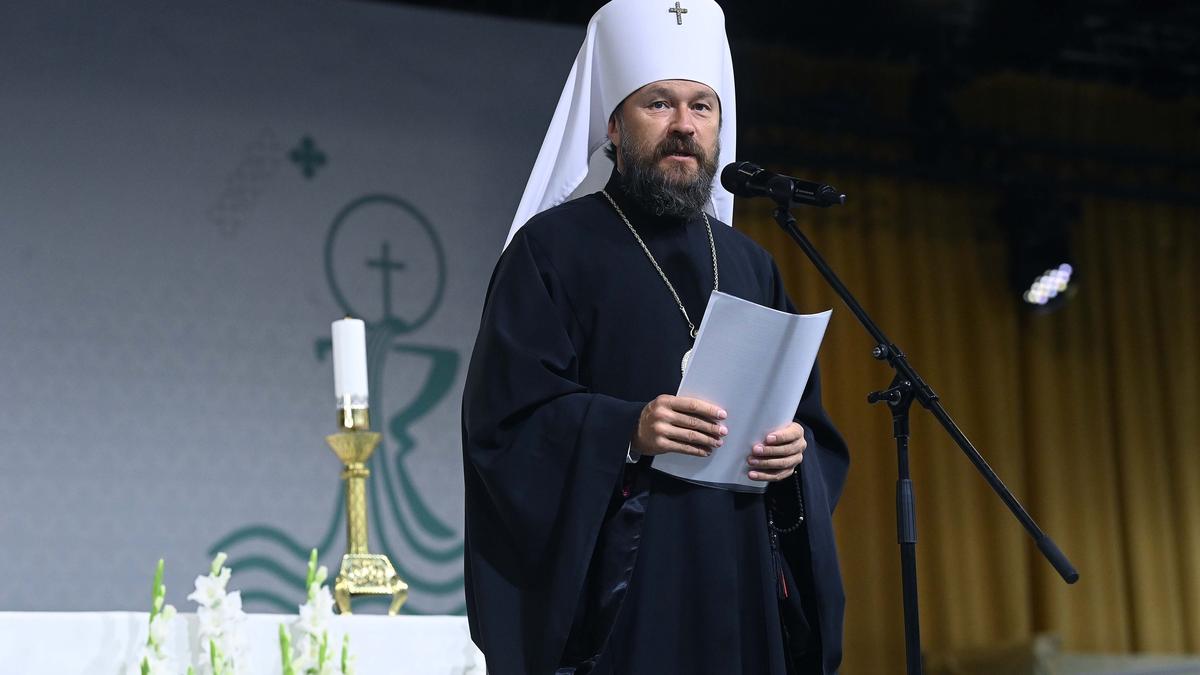The Holy Synod of the Russian Orthodox Church announced the temporary suspension of the metropolitan of Budapest and Hungary from his diocese on Thursday, pending the findings of a commission appointed to study “the situation there”. While the wording of the church statement was deliberately ambiguous, the matter being investigated is almost certainly a series of recent sexual harassment claims against Metropolitan Hilarion.
A staunch defender of so-called “traditional values” known for his ultraconservative approach to church doctrine, Hilarion Alfeyev, a close ally of Russian Orthodox Church head Patriarch Kirill, was revealed by Novaya Gazeta Europe earlier this month to be at the centre of a series of sexual misconduct allegations made by his now 21-year-old former assistant.
Once frequently tipped as a potential successor to Patriarch Kirill, Metropolitan Hilarion was for many years a powerful figure within the Russian Orthodox Church who headed the Moscow Patriarchate’s Department of External Church Relations from 2009–2022, while also maintaining a close relationship with the head of the church.
Hilarion has maintained that “sexual orientation is not innate, but develops in early childhood and adolescence” and has advocated the introduction of similar bans on “gay propaganda” in other countries.
Hilarion has for years been a vocal critic of LGBT acceptance in churches around the world, and has publicly criticised other Christian denominations, including the Roman Catholic Church, for allowing the blessing of same-sex partnerships. In 2021, alongside Vladimir Putin and Patriarch Kirill, Alfeyev supported the expansion of Russia’s notorious “gay propaganda” law, which further criminalised the sharing of any material positively depicting LGBT relationships, and which was a milestone in Russia’s continuing assault on queer identities. Hilarion has maintained that “sexual orientation is not innate, but develops in early childhood and adolescence” and has advocated the introduction of similar bans on “gay propaganda” in other countries.
Hilarion’s rise through the ranks of the church over the past two decades had landed him in increasingly powerful positions, until June 2022 when he was suddenly and without explanation appointed the metropolitan of Budapest and Hungary, a clear demotion that saw him relocated to a relative backwater in Russian Orthodox terms. While the circumstances of Hilarion’s reassignment remain uncertain, The Moscow Times reported shortly afterwards that it followed an investigation by a special commission set up on the instructions of Patriarch Kirill into alleged financial misconduct.
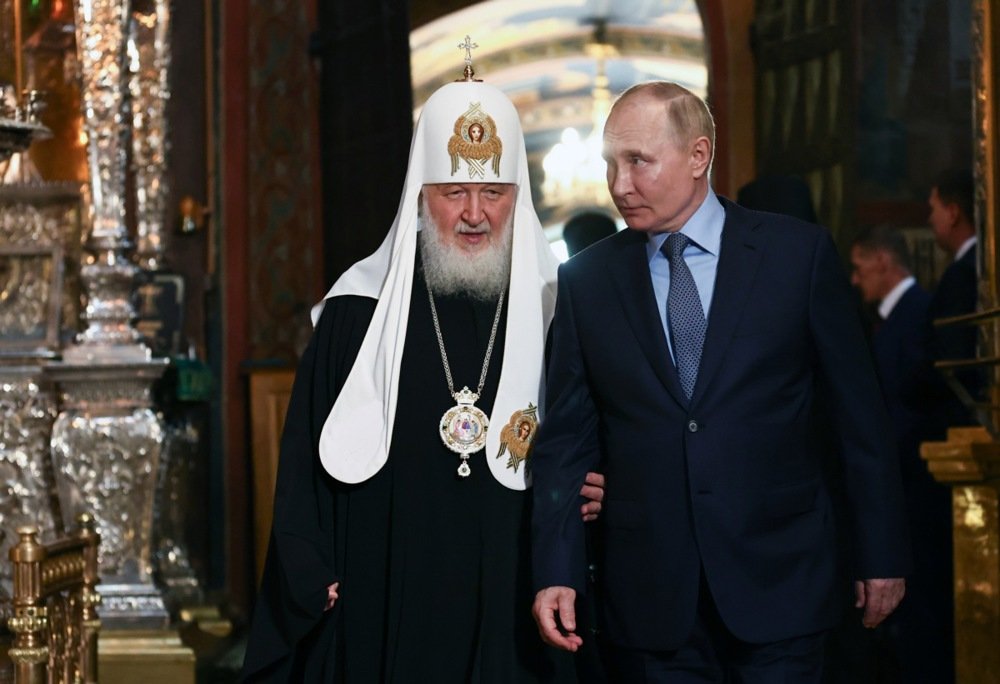
Vladimir Putin and Patriarch Kirill visit the Trinity Cathedral in Moscow Russia, 26 June 2024. Photo: Mikhail Tereschenko / EPA
Further complicating the metropolitan’s relocation is a leaked image of Hilarion’s Hungarian passport, which, according to its date of issue, was granted just three months after Hilarion’s appointment to lead the Orthodox Church in Hungary. In other words, Hilarion appears to have been granted Hungarian citizenship within a time frame that’s unheard of in any EU country. If the image is authentic, Hilarion’s expedited citizenship must have come as a result of intervention from the highest levels of Hungarian officialdom.
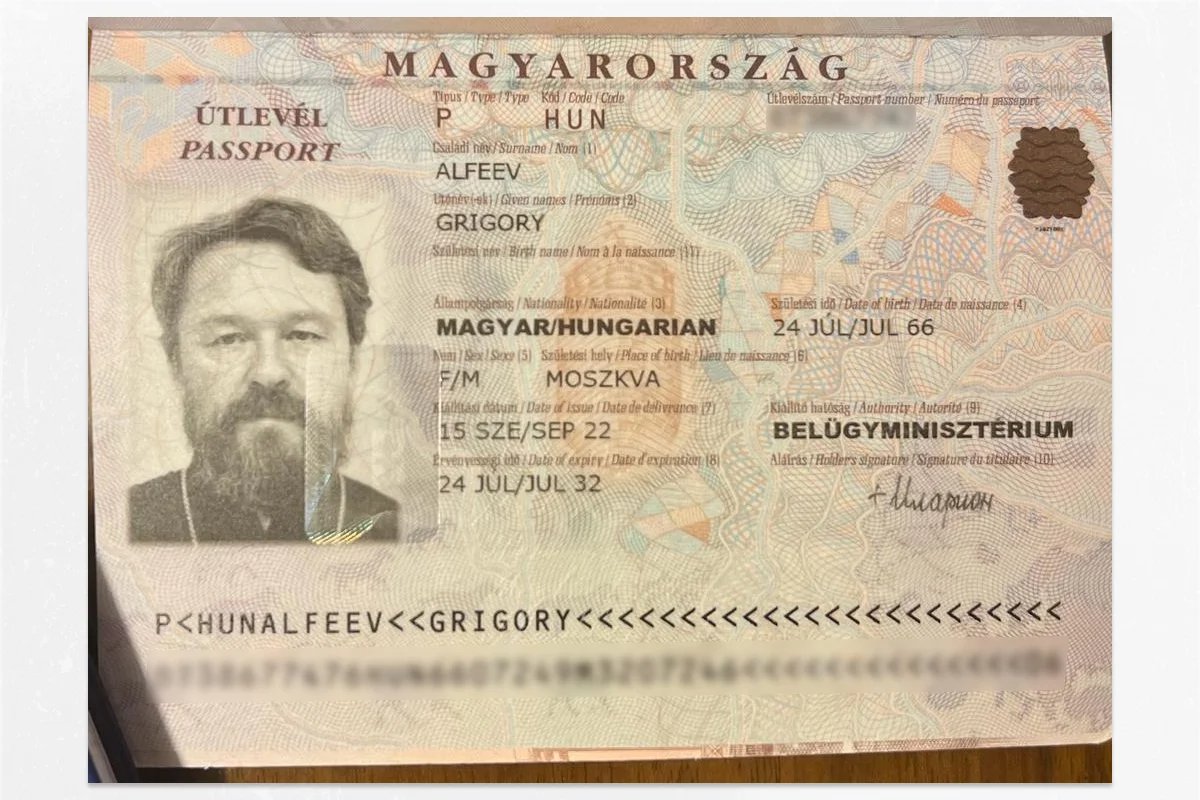
Photo courtesy of George Suzuki
Nonetheless, during what has been described as his “exile” to Hungary, Hilarion has taken on several high-profile roles, including as a liaison between the Russian Orthodox Church and the West, which has seen him meeting with senior officials from the Catholic Church, including the Pope himself. Hilarion has also been active in Hungarian–Russian relations, and according to Radio Free Europe, was involved in the Russian return of 11 ethnically Hungarian Ukrainian prisoners of war.
Sexual misconduct allegations
Shortly after Alfeyev moved to Hungary, a Russian-Japanese student of Orthodoxy, George Suzuki, was appointed to be his cell-attendant, the Orthodox term for a personal secretary to a high-ranking church official, and moved to Budapest to take up his new position in October 2022.
While Suzuki says he initially lived in a church cell and assisted Hilarion only on church-related matters, he was soon asked to move into Hilarion’s residence to help out with housework.
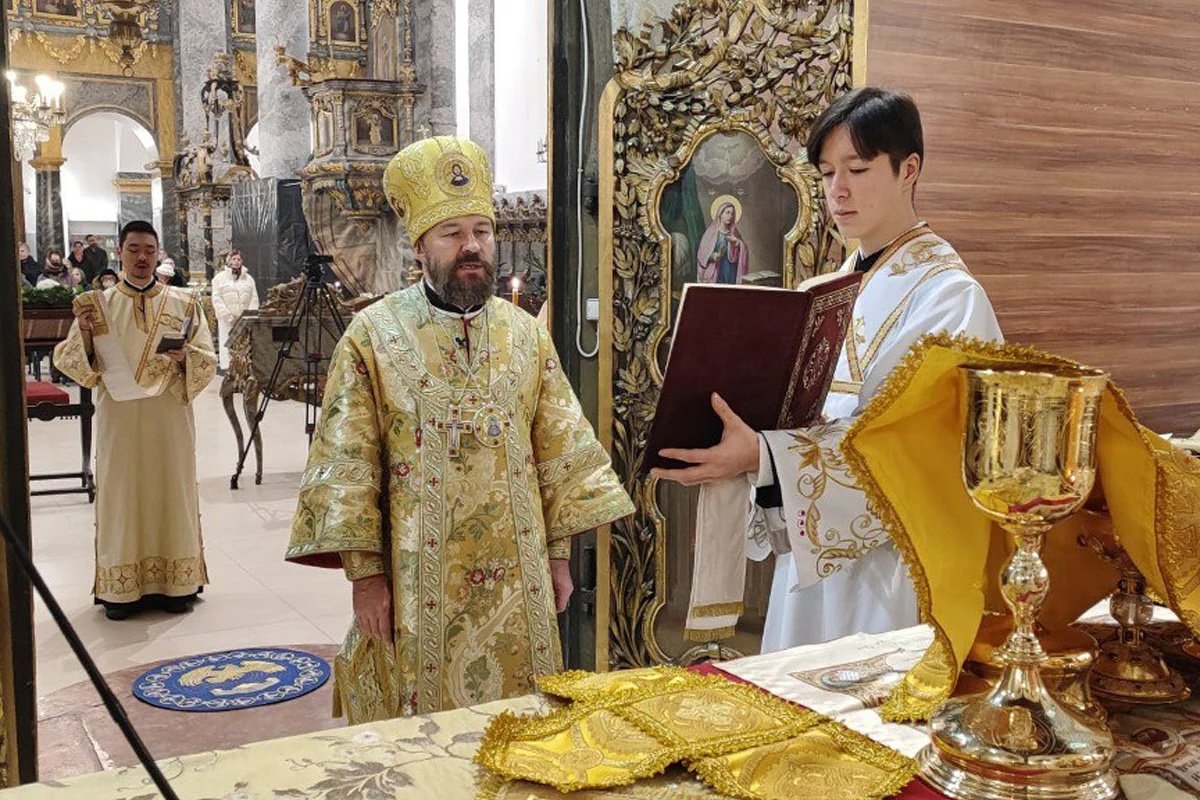
Hilarion and Suzuki together at mass in Hungary. Photo: Parish of the Holy Trinity
Suzuki says that in November he accompanied Hilarion to a lavish mansion he owned on the French side of Lake Geneva. While there, Suzuki alleges that the first instance of alleged sexual misconduct took place while he was in bed with a high fever. Suzuki told Novaya Europe that Hilarion nonconsensually stripped him down to his underwear and lay on top of him while he was in bed.
Following the first incident in France, Suzuki says that Hilarion regularly began to get into bed with him, and though this did not lead to sexual intercourse, Hilarion became ever more sexually overt with Suzuki, demanding that he wear no clothes in bed.
When he expressed his discomfort with the metropolitan’s behaviour, Suzuki says that Hilarion began to threaten him.
Suzuki says that he was subjected to intense pressure and coercion by Hilarion, and that the situation soon became untenable. When he expressed his discomfort with the metropolitan’s behaviour, Suzuki says that Hilarion began to threaten him, and Hilarion can be heard responding to his cell-attendant’s complaints in covert recordings made by Suzuki, warning him that nothing would “work out” for him if he left his position in his household, and that he could face excommunication due to the metropolitan’s powerful position within the church.
In another particularly graphic recording, Hilarion forbids Suzuki from wearing pyjamas to bed, telling him he wants to “feel him with his skin” and “lay down in bed” with him “like a father”.
Despite his attempts to resist, Suzuki says that the metropolitan’s assaults continued.
Alfeyev has called the sexual misconduct claims “groundless” and said he plans to sue Suzuki for defamation. Though he has not denied the authenticity of the covert recordings made by Suzuki, Alfeyev has categorically denied having had sexual intercourse with his cell-attendant. He has also said that he wouldn’t be commenting further on the claims as anything he says “could harm the investigation”.
A lavish lifestyle
Hilarion leads a luxurious lifestyle, according to Suzuki, who described the metropolitan’s frequent stays on lavish yachts and skiing trips to expensive resorts. Suzuki also provided Novaya Europe with documents detailing Hilarion’s purchase of a €1.9 million mansion in Budapest that boasts 14 rooms, a swimming pool, a private gym, a wine cellar and a six-car parking garage.
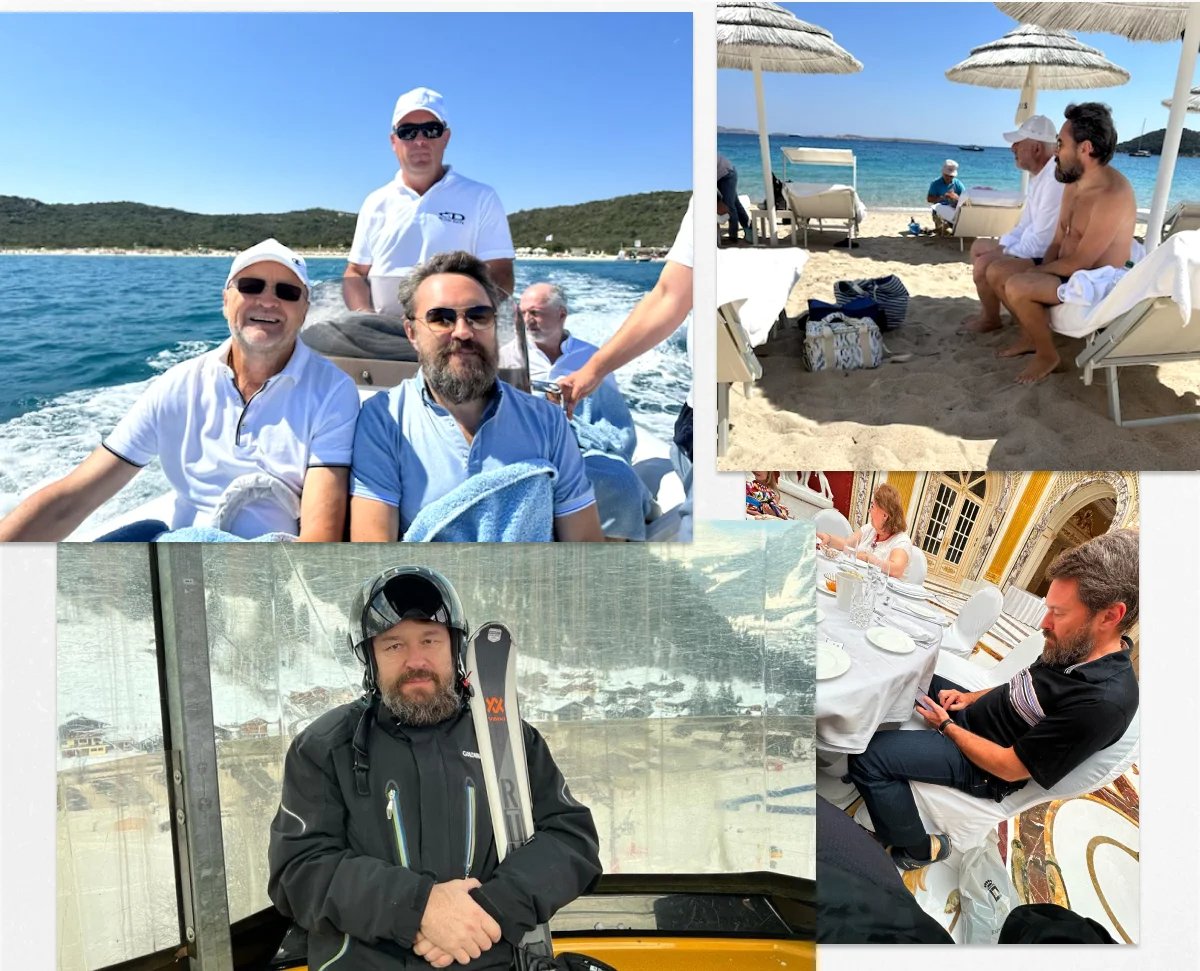
Photos courtesy of George Suzuki
In one of Suzuki’s covert recordings, Hilarion can be heard describing how he plans to use funds intended for building a new church for his own purposes. Suzuki named several prominent Russian businessmen under sanctions as regular donors to the church, including Dmitry Pumpyansky, God Nisanov, Petr Aven and Valery Kogan all as possible sponsors.
Hilarion does not deny that he owns expensive property in Hungary, explaining instead that the “royalties” he receives from his books and films help support his lifestyle. He has also denied that donor money had ever been used to fund real estate purchases and insisted that the new church would eventually be constructed.
Escape, theft and bribery
In January, Suzuki says he decided to escape, and, having convinced Alfeyev that he had to travel to Budapest to take a blood test, he left the parish and, shortly after, the country, returning to Japan.
By his own admission, before leaving Alfeyev’s residence, Suzuki stole various watches as well as cash belonging to Hilarion, worth a total of approximately €30,000, believing that the items would protect him from his former employer. Once he arrived in Japan, Suzuki reported his theft to the Japanese Embassy in Budapest, despite which a criminal case was brought against him in Hungary.
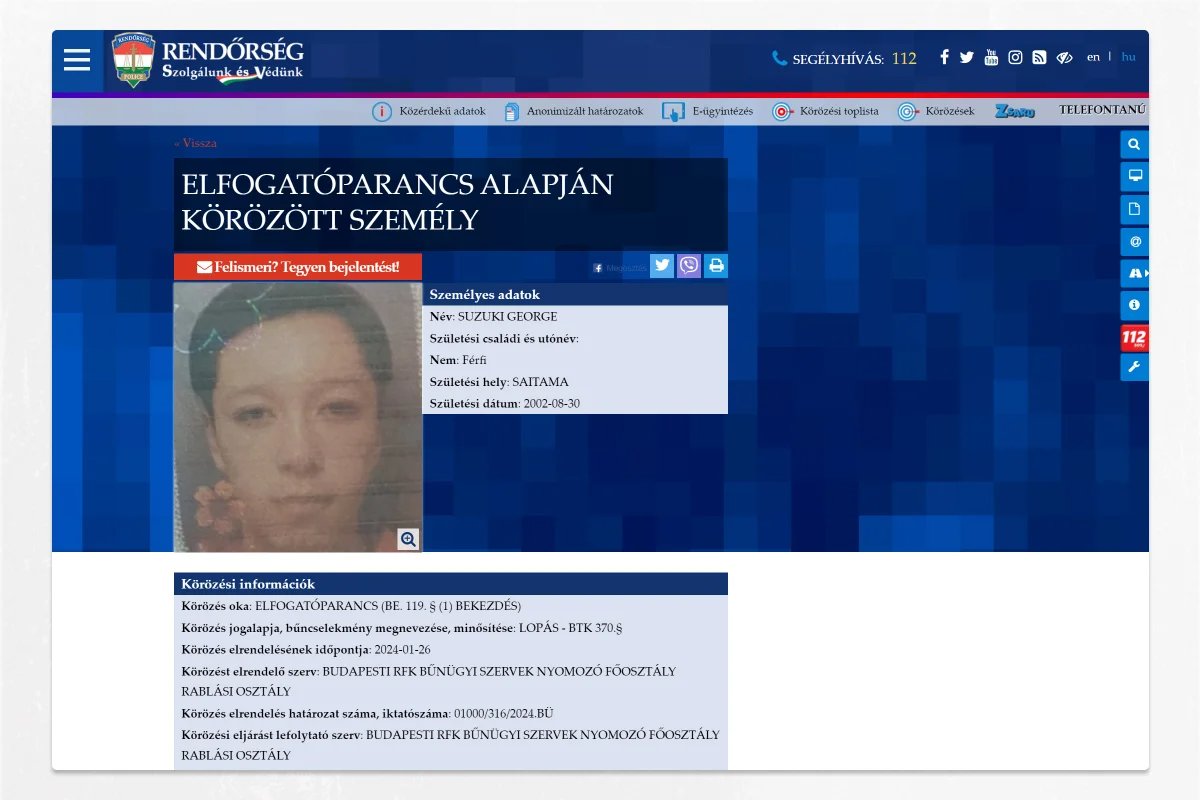
Screenshot from Hungary's wanted database
Following Suzuki’s departure, Alfeyev sent him multiple emails apologising for his conduct, while also negotiating with Suzuki’s family to buy his silence. In one email with the subject line “Forgiveness”, Hilarion writes that the money Suzuki stole could be seen as a token of his “sincere regret for all the mistakes made”.
According to Alfeyev, however, the Suzuki family began to blackmail him once Suzuki’s mother Veronika became involved in the negotiations. “The woman saw that I had what she thought was a lot of money and decided that she needed to take advantage of it,” Hilarion said. Eventually, Suzuki’s mother rejected Hilarion’s offers on the grounds that they were “insufficient”, though she subsequently told Novaya Europe that she had only asked for the money to pay for the therapy needed by her son after his ordeal.
The Hungarian authorities are still investigating the theft from the Hungarian Diocese and Suzuki is now wanted for theft. Since then, however, Alfeyev has made a number of additional allegations against Suzuki, including, in one email he wrote to him, that he possessed child pornography.
Suzuki adamantly denied the child pornography allegation when he spoke to Novaya Europe, and stressed that he stole from and covertly filmed Alfeyev only to ensure his own safety. While he admitted to searching for pornography online and signing up for gay dating sites, he points out that his actions were not illegal, even if they did go against Orthodox doctrine.
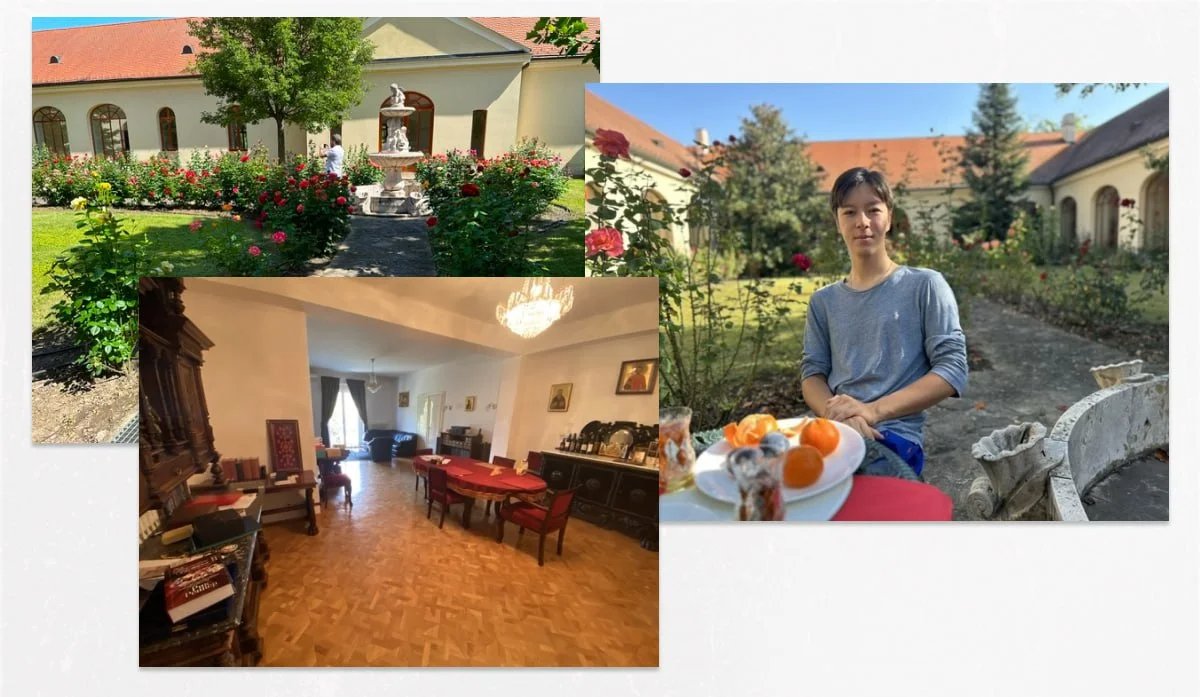
Photos courtesy of George Suzuki
Support from the Church
“The allegations of sexual abuse made by Suzuki are so incoherent and unconvincing that it is difficult to believe them,” Archpriest Nikolay Kim, the spokesperson for the Budapest and Hungarian diocese of the Moscow Patriarchate, told state-owned Russian news agency TASS when approached for comment on the accusations.
Kim went on to allege that Veronika Suzuki had attempted to use the “illegally” recorded conversations between her son and Alfeyev to extort €384,000 from the metropolitan, adding that the authenticity of the recordings could only be proved “in court”.
Priests, archpriests and deacons who make up the clergy of the Hungarian diocese signed an open letter in support of Alfeyev, praising what they called his “purity of life and high moral character”
On 10 July, the 15 priests, archpriests and deacons who make up the clergy of the Hungarian diocese signed an open letter in support of Alfeyev, praising what they called his “purity of life and high moral character” and urging Hungary’s Orthodox community and the wider public to disregard Suzuki’s accusations.
Earlier this month, state-owned Russian news agency RIA Novosti published an interview with Hilarion in which he said that Suzuki was being investigated for theft, document forgery, illegally accessing and distributing private data, and possession of child pornography, and added that Suzuki’s mother was now also being investigated for extortion.
“Six months after the theft and escape, it suddenly turns out that the perpetrator was the victim. Why didn’t he immediately contact the police if he was harassed? Why did he wait six months? And why was it necessary to steal?” Alfeyev asked.
Global implications
According to Sergey Chapnin, a scholar at the Russian Orthodox Christian Studies Centre at Fordham University in New York, and a former employee of the Moscow Patriarchate, the gravity of the accusations against Alfeyev “cannot be overstated” and had “reverberated through the Orthodox community, both in Russia and internationally”.
“Regrettably, I had to affirm repeatedly that the allegations are indeed credible,” Chapnin told Novaya Europe, adding that his “awareness of the situation long preceded” Novaya Europe’s original investigation into the sexual misconduct claims, adding that he could “attest to their accuracy”.
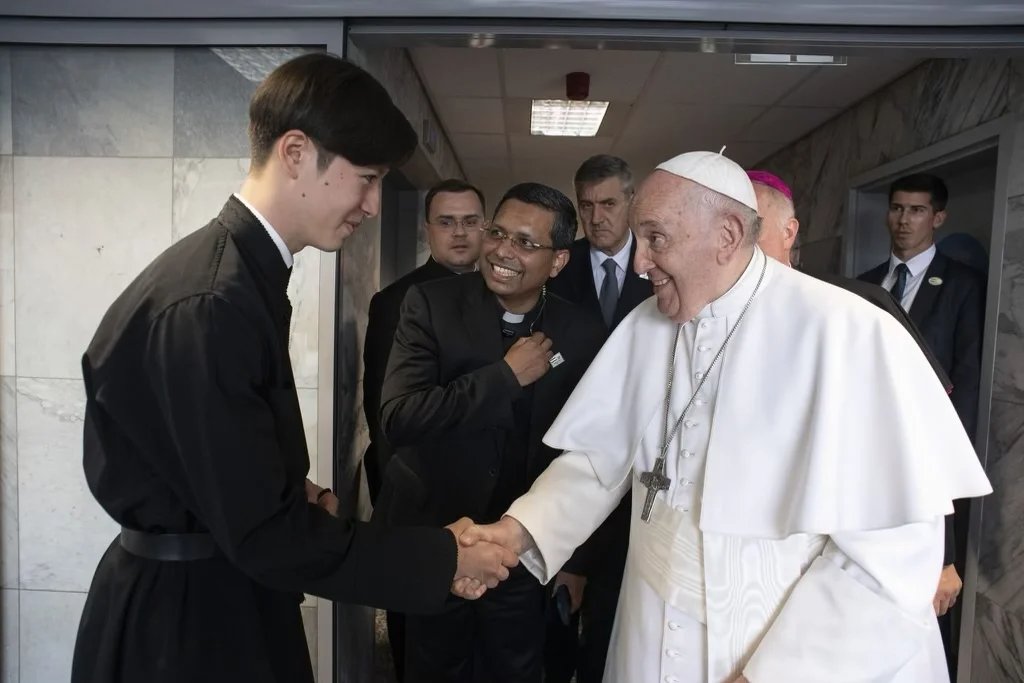
Photo courtesy of George Suzuki
Inga Leonova, the editor-in-chief of The Wheel, a well-known academic and cultural journal on Russian Orthodoxy, described the Alfeyev case as “a classic story”: a Church leader purports to lead a conservative, clean-cut life but behaves very differently behind closed doors.
The fact that Alfeyev had long been a “spokesperson for the patriarchy about the sexual licentiousness of the West” was “disgusting”, Leonova said, nevertheless adding that “Suzuki’s decision to eventually go public” was probably due to the failure of his attempts to blackmail Hilarion.
“There is a lot of don’t-ask-don’t-tell in the Russian church, meaning that everyone who is in the milieu is always trading stories about the sexual proclivities of the hierarchs,” Leonova told Novaya Europe.
Both Leonova and Chapnin said sexual misconduct within the Russian Orthodox Church is widespread and well-known. However, accusations of sexual harassment are rarely ever investigated and pressure from powerful Church officials may prevent victims from coming forward.
“There is a lot of don’t-ask-don’t-tell in the Russian church, meaning that everyone who is in the milieu is always trading stories about the sexual proclivities of the hierarchs,” Leonova told Novaya Europe.
“I would say that the situation is probably even more dire than it was in the Catholic Church before the Spotlight investigation because everybody talks, nobody investigates, nobody ever goes on record, and no one ever comes forward with accusations because there is nowhere to go.”
Additional reporting for this story was done by Owen Gramley.
